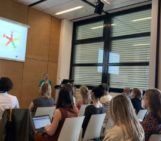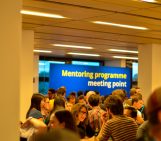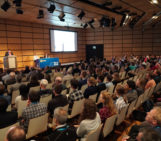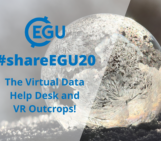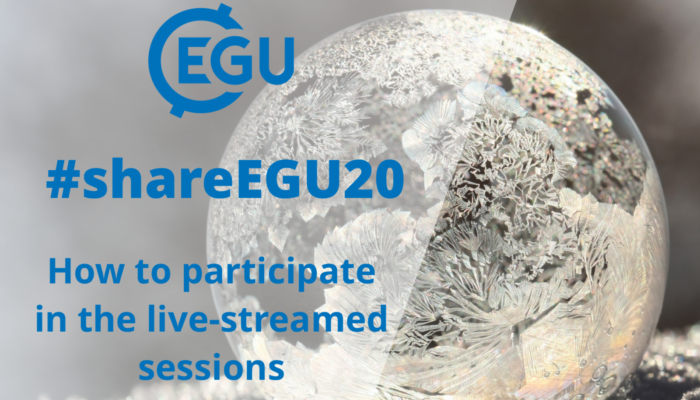
The foundation of Sharing Geoscience Online, as the name of course suggests, is interacting with other scientists, whether via the presentation materials you upload, comments you exchange with colleagues, and/or the live text chats scheduled for each session.
In addition to the text-based interactions, all week you’ll also be able to participate in a series of Union-wide sessions, short courses and other networking events. Chief amongst these are the ten 2020 Union Symposia and Great Debates, which will be live streamed, with the videos uploaded to YouTube afterwards.
Every day we will also be releasing a pre-recorded short course to our YouTube channel and supporting several other ‘live’ events including an interactive science poetry course and press conferences. So, what do you do if you want to participate in one of these special multi-media events?
Union Symposia and Great Debates
During Sharing Geoscience Online, the ten Union Symposia and the Great Debates will be streamed online using Zoom’s webinar format. The session descriptions and the links to participate in each symposium or debate are available in the Programme and the schedule is listed below.
Live-streamed Great Debates will last for 1 hour while the Union Symposia will be a maximum of 1 hour 45 minutes. Conveners have also been given the option of including a Q&A time during the webinar so that participants can ask questions – just like in a regular session!
Following the live stream, an edited recording of each session will be uploaded onto EGU’s YouTube channel so that anyone who was unable to join in live, or who would like to re-watch the webinar with subtitles, can view it there.
Live-streamed session schedule (all times are CEST):
Monday 4 May
GDB3: Cutting carbon in the geosciences: conference participation versus online streaming and fieldwork versus remote observations 10:45-11:45. Register now!
US1: Best practices for scientific integrity and scientific freedom in an age of pandemics – and beyond (Co-sponsored by AGI, AGU, AOGS, GSA, GSL, and JpGU) 16:15-18:00. Register now!
Tuesday 5 May
US5: The future of Earth and Planetary Observations from Space 10:45-12:30. Register now!
GDB4: Are forests a solution to climate change? 14:00-15:00. Register now!
Wednesday 6 May
US3: The role and impact of fire in the Earth system across spatial and temporal scales 10:45-12:30. Register now!
GDB1: Academic meritocracy: is it a challenge to women’s careers? (Co-sponsored by AGU, AOGS and JpGU) 16:15-17:15. Register now!
Thursday 7 May
US2: Geosciences and UN Sustainable Development Goals: pathways for the future 10:45-12:30. Register now!
GDB5: Values versus facts: should geoscience get personal? 16:15-17:15. Register now!
Friday 8 May
US4: Communicating A Global Climate Crisis: If our house is on fire, why haven’t we called the fire brigade…? 10:45-12:30. Register now!
GDB2: Managing our mineral resources for a sustainable future: The role of earth scientists 14:00-15:00. Register now!
Short Courses
EGU will also offer seven Short Courses that will be of interest to a large number of EGU members. These pre-recorded courses will likewise be in a shorter-than-usual, webinar-style format and will be published daily at 12:30 CEST. More information about the selected short courses, including a schedule, will be posted next week.
You’ll be able to view these pre-recorded Short Courses by visiting the EGU YouTube channel. The conveners and speakers of each Short Courses will also be available directly after their Short Course is published, between 12:30 until 13:45 CEST, to answer any questions that you have in that day’s video’s comment section. This will offer another fun opportunity to interact with the speakers, contribute your thoughts, and learn something new!
Press Conferences
In addition to our scientific and networking offers, EGU will also be continuing our tradition of sharing cutting edge geoscience research with the press via our specially designed press conferences. If you are curious about press conferences, #shareEGU20 participants are also invited to observe them, as they will be held virtually for the first time. A regularly updated schedule, as well as login information, are available through the EGU Press Centre website.
For more information about our other networking activities, as well as other special live events, check back in with the blogs next week as we feature our #shareEGU20 highlights.
Due to the ongoing coronavirus outbreak, EGU has made the decision to cancel this year’s physical General Assembly in Vienna and instead offer a partial alternative meeting online, called #shareEGU20. Over the next few weeks in the run up to #shareEGU20, which will be held from the 4 – 8 May 2020, we will be posting regular updates and information about how to get involved, what EGU can offer during this week and how to find each other. We know that there will be many, many questions that people have, and we are learning how to do this right along with you, so please send us your questions over social media or by emailing egu2020@copernicus.org or communications@egu.eu. We’re looking forward to sharing EGU with you, online!

